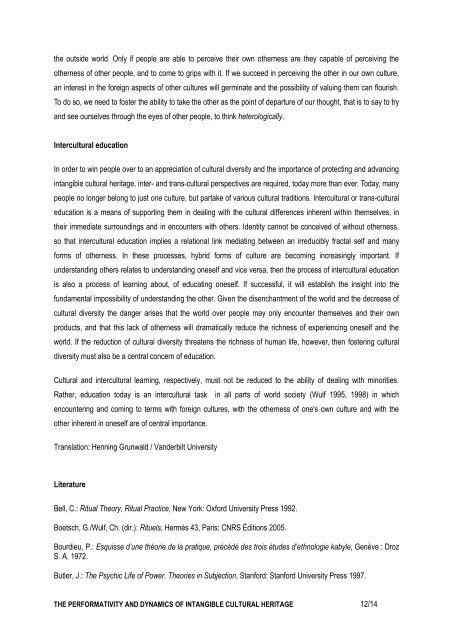the performativity and dynamics of intangible cultural heritage
the performativity and dynamics of intangible cultural heritage
the performativity and dynamics of intangible cultural heritage
You also want an ePaper? Increase the reach of your titles
YUMPU automatically turns print PDFs into web optimized ePapers that Google loves.
<strong>the</strong> outside world. Only if people are able to perceive <strong>the</strong>ir own o<strong>the</strong>rness are <strong>the</strong>y capable <strong>of</strong> perceiving <strong>the</strong><br />
o<strong>the</strong>rness <strong>of</strong> o<strong>the</strong>r people, <strong>and</strong> to come to grips with it. If we succeed in perceiving <strong>the</strong> o<strong>the</strong>r in our own culture,<br />
an interest in <strong>the</strong> foreign aspects <strong>of</strong> o<strong>the</strong>r cultures will germinate <strong>and</strong> <strong>the</strong> possibility <strong>of</strong> valuing <strong>the</strong>m can flourish.<br />
To do so, we need to foster <strong>the</strong> ability to take <strong>the</strong> o<strong>the</strong>r as <strong>the</strong> point <strong>of</strong> departure <strong>of</strong> our thought, that is to say to try<br />
<strong>and</strong> see ourselves through <strong>the</strong> eyes <strong>of</strong> o<strong>the</strong>r people, to think heterologically.<br />
Inter<strong>cultural</strong> education<br />
In order to win people over to an appreciation <strong>of</strong> <strong>cultural</strong> diversity <strong>and</strong> <strong>the</strong> importance <strong>of</strong> protecting <strong>and</strong> advancing<br />
<strong>intangible</strong> <strong>cultural</strong> <strong>heritage</strong>, inter- <strong>and</strong> trans-<strong>cultural</strong> perspectives are required, today more than ever. Today, many<br />
people no longer belong to just one culture, but partake <strong>of</strong> various <strong>cultural</strong> traditions. Inter<strong>cultural</strong> or trans-<strong>cultural</strong><br />
education is a means <strong>of</strong> supporting <strong>the</strong>m in dealing with <strong>the</strong> <strong>cultural</strong> differences inherent within <strong>the</strong>mselves, in<br />
<strong>the</strong>ir immediate surroundings <strong>and</strong> in encounters with o<strong>the</strong>rs. Identity cannot be conceived <strong>of</strong> without o<strong>the</strong>rness,<br />
so that inter<strong>cultural</strong> education implies a relational link mediating between an irreducibly fractal self <strong>and</strong> many<br />
forms <strong>of</strong> o<strong>the</strong>rness. In <strong>the</strong>se processes, hybrid forms <strong>of</strong> culture are becoming increasingly important. If<br />
underst<strong>and</strong>ing o<strong>the</strong>rs relates to underst<strong>and</strong>ing oneself <strong>and</strong> vice versa, <strong>the</strong>n <strong>the</strong> process <strong>of</strong> inter<strong>cultural</strong> education<br />
is also a process <strong>of</strong> learning about, <strong>of</strong> educating oneself. If successful, it will establish <strong>the</strong> insight into <strong>the</strong><br />
fundamental impossibility <strong>of</strong> underst<strong>and</strong>ing <strong>the</strong> o<strong>the</strong>r. Given <strong>the</strong> disenchantment <strong>of</strong> <strong>the</strong> world <strong>and</strong> <strong>the</strong> decrease <strong>of</strong><br />
<strong>cultural</strong> diversity <strong>the</strong> danger arises that <strong>the</strong> world over people may only encounter <strong>the</strong>mselves <strong>and</strong> <strong>the</strong>ir own<br />
products, <strong>and</strong> that this lack <strong>of</strong> o<strong>the</strong>rness will dramatically reduce <strong>the</strong> richness <strong>of</strong> experiencing oneself <strong>and</strong> <strong>the</strong><br />
world. If <strong>the</strong> reduction <strong>of</strong> <strong>cultural</strong> diversity threatens <strong>the</strong> richness <strong>of</strong> human life, however, <strong>the</strong>n fostering <strong>cultural</strong><br />
diversity must also be a central concern <strong>of</strong> education.<br />
Cultural <strong>and</strong> inter<strong>cultural</strong> learning, respectively, must not be reduced to <strong>the</strong> ability <strong>of</strong> dealing with minorities.<br />
Ra<strong>the</strong>r, education today is an inter<strong>cultural</strong> task in all parts <strong>of</strong> world society (Wulf 1995, 1998) in which<br />
encountering <strong>and</strong> coming to terms with foreign cultures, with <strong>the</strong> o<strong>the</strong>rness <strong>of</strong> one's own culture <strong>and</strong> with <strong>the</strong><br />
o<strong>the</strong>r inherent in oneself are <strong>of</strong> central importance.<br />
Translation: Henning Grunwald / V<strong>and</strong>erbilt University<br />
Literature<br />
Bell, C.: Ritual Theory, Ritual Practice, New York: Oxford University Press 1992.<br />
Boetsch, G./Wulf, Ch. (dir.): Rituels, Hermès 43, Paris: CNRS Éditions 2005.<br />
Bourdieu, P.: Esquisse d’une théorie de la pratique, précédé des trois études d’ethnologie kabyle, Genève : Droz<br />
S. A. 1972.<br />
Butler, J.: The Psychic Life <strong>of</strong> Power. Theories in Subjection, Stanford: Stanford University Press 1997.<br />
THE PERFORMATIVITY AND DYNAMICS OF INTANGIBLE CULTURAL HERITAGE 12/14


